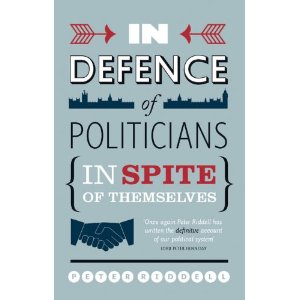In Defence of Politicians: Peter Riddell’s new book
 For decades Peter Riddell has been one of the best British political commentators, regularly providing his readers with insight rather than, as is the way with second-rate commentators, simply leaving the reader little more enlightened at the end of a piece that knowing that, yes, that commentator’s own political views are the same as they were last time.
For decades Peter Riddell has been one of the best British political commentators, regularly providing his readers with insight rather than, as is the way with second-rate commentators, simply leaving the reader little more enlightened at the end of a piece that knowing that, yes, that commentator’s own political views are the same as they were last time.
So his book, In Defence of Politicians Inspite of Themselves, has many years of experience and analysis behind it. It originated in a lecture he gave on the same theme in February 2010 and reads like an extended version of the lecture. As a lecture followed by a lively discussion, the book’s themes would work really well. However, as a free-standing book it does not work quite so well. The book’s brevity means points are not normally developed in much detail or given much supporting evidence, yet even as a short book it still has a length from which most readers would expect a little more substance to the arguments.
A good example is Riddell’s well-made point that people complaining the current lot of politicians are banal, untrustworthy, inefficient or disreputable is nothing new. It has been made for decades and even centuries with even, as Riddell points out, Henry Carey putting in a jibe about them in his words for the British national anthem.
Yet Riddell leaves it at that rather than looking in more detail about how comparisons over time really do look. He could, for example, have looked at the vicious personalised religious bigotry that featured often in early nineteenth century election literature, bolstering his case about how current politicians compare not that badly to their predecessors.
Moreover, was the early to mid twentieth century an unusual period, with the quality of politics, levels of participation in elections and levels of party membership having peaked then and now returned to more normal levels? In other words, is the question really not why is politics now as it is, but why did it have that unusual period for part of the last century?
Likewise, Riddell bemoans the rise of the hyper-partisan political commentator – yet again they were very common in the nineteenth century and earlier. And concerns over political influence of media owners now should be put in the context of politicians directly funding newspapers back then and making widespread use of anonymous attack pieces.
The book also leaves the public largely unmentioned. Riddell criticises the frequency with which politicians over the years make promises and raise hopes before elections and then struggle to meet them afterwards. But as it’s a cycle he has chronicled over many decades it is a shame he does not look further into this and ask why. Why have voters not started behaving differently? Would changing the frequency of elections help? Is there a problem with turnover amongst political journalists?
I am sure that if Riddell had been asked such questions at the end of a talk he would have had thoughtful and interesting answers to them. It is a shame however that is not captured in the book.
That said, it is a very readable romp across many aspects of politics, with many on the receiving end of fierce criticism, including political scientists (“to read many political science journals is to enter an enclosed and often narcissistic world … often unreadable to anyone but a narrow group of specialists”) and people who comment on political blogs (“many of the comments attached even to largely sensible posts are hate-filled rants … sneering contempt is expressed for anyone else’s motives or points of view”).
It also provides a good overview of who has written the major works in this area, providing a jumping off point for other reading, and throws in some well made points that are often neglected (such as it is hard to sustain an argument about MPs being horribly supine compared to great predecessors when in fact they rebel now far more than previous decades).
As the title of one of his previous books, Honest Opportunism, implies Riddell sees both the good and bad points of politicians and this book, despite its more forthright title, once again does the same.
You can buy Peter Riddell’s In Defence of Politicians Inspite of Themselves here.
Leave a Reply